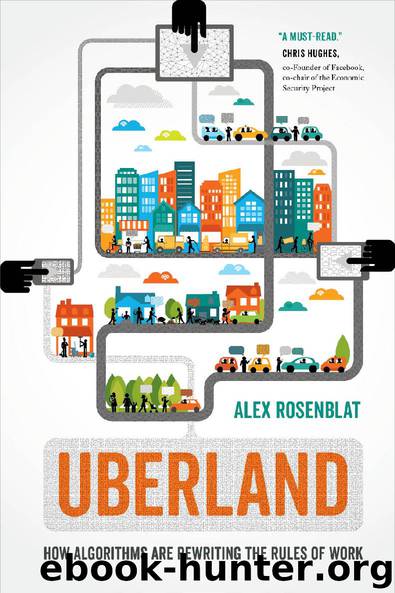Uberland: How Algorithms Are Rewriting the Rules of Work by Alex Rosenblat

Author:Alex Rosenblat [Rosenblat, Alex]
Language: eng
Format: epub, mobi
ISBN: 9780520298576
Publisher: University of California Press
Published: 2018-10-23T06:00:00+00:00
HOW UBER TREATS DRIVERS LIKE CONSUMERS
We’ve seen how algorithmic management can produce biases and manipulate consumers of Facebook, Google, and the products of other Silicon Valley companies. Similarly, inequities among drivers can emerge when algorithmic bosses deceive them. We also know that Uber monitors drivers through the data they generate on the job to control their behavior in a workplace context. Yet in some ways, Uber explicitly adopts a model of customer service communications in managing drivers as workers. Beyond intense supervision, Uber controls drivers by creating an appeals process that limits their ability to find resolutions to their concerns. For example, drivers’ primary (and often exclusive) point of communication with Uber is by email, although toward the end of 2017, drivers gained in-person driver hubs (physical locations where drivers can receive in-person support) and a telephone number to call in some cities. Drivers don’t have a dedicated human manager who responds to their inquiries. Instead, they have community support representatives (CSRs), located at the email equivalent of a call center, often located abroad, such as in the Philippines,8 and managed by third-party companies, like Zendesk.9 Effectively, Uber offshores and automates its main communications with drivers. Drivers receive automated replies to most of their inquiries, which often appear to be based on keywords in the text of their emails. In other words, Uber is managing drivers without a human that understands and is responsive to nuances. While automated responses might be practical for basic factual inquiries, they can prove woefully insufficient when a passenger overdoses in the backseat or harasses a driver. One driver, echoing a sentiment commonly posted in an online forum, remarked, “Not to trash Uber but the support is nil at best. Most of the responses I get are less than adequate to the topic at hand. It seems that if it involves something other than a rider issue or a fare not starting on time, no one understands wtf you are talking about even though you are speaking the King’s English.”
While we are all familiar with bad customer service, this takes a greater toll in an employment context because drivers depend on these CSRs to resolve questions related to their livelihood. Ramon, who drives for both Uber and Lyft in Atlanta, told one story in our interview about a passenger who accused him of drunk driving in the “passenger feedback” comments. When I interviewed him in 2017, Ramon went to great lengths to explain to me that he works at night, when many passengers have been drinking, and that they can leave the smell of alcohol in the car. Ramon, who is a diabetic, told me he would be passed out in the hospital if he had been drinking. Things didn’t go well when a passenger complained to Uber. Ramon was instantly deactivated once the passenger submitted the comment, and he had to stop in the middle of working to write several emails to try to get reinstated. As Linda, a Boston-area driver who works for
Download
Uberland: How Algorithms Are Rewriting the Rules of Work by Alex Rosenblat.mobi
This site does not store any files on its server. We only index and link to content provided by other sites. Please contact the content providers to delete copyright contents if any and email us, we'll remove relevant links or contents immediately.
Mastering Bitcoin: Programming the Open Blockchain by Andreas M. Antonopoulos(3030)
Dawn of the New Everything by Jaron Lanier(2760)
Blockchain: Ultimate Step By Step Guide To Understanding Blockchain Technology, Bitcoin Creation, and the future of Money (Novice to Expert) by Keizer Söze(2475)
Alibaba by Duncan Clark(2071)
Foundations of Blockchain by Koshik Raj(1975)
Owning Bitcoin: The Illustrated Guide to Security, Privacy, and Potential by Apodaca Richard(1957)
Significant Zero by Walt Williams(1954)
The Mastermind by Evan Ratliff(1930)
Mastering Blockchain by Imran Bashir(1858)
Bitcoin: The Basics of Blockchain and Investing in Cryptocurrency by K. Connors(1799)
Bitcoin: The Ultimate Guide to the World of Bitcoin, Bitcoin Mining, Bitcoin Investing, Blockchain Technology, Cryptocurrency (2nd Edition) by Ikuya Takashima(1686)
Attack of the 50 Foot Blockchain by David Gerard(1668)
Turing's Cathedral by George Dyson(1663)
The Bitcoin Standard: The Decentralized Alternative to Central Banking by Saifedean Ammous(1649)
Cryptocurrency by Neil Hoffman(1636)
Shaping the Fourth Industrial Revolution by Klaus Schwab & Nicholas Davis & Satya Nadella(1614)
Dawn of the New Everything: Encounters with Reality and Virtual Reality by Jaron Lanier(1608)
The Bitcoin Guidebook by Ian DeMartino(1606)
Elon Musk by Walter Isaacson(1559)
